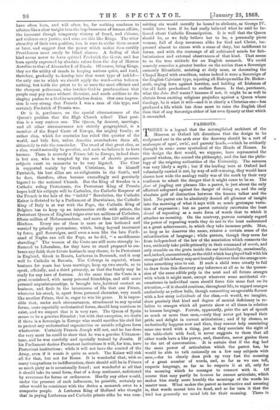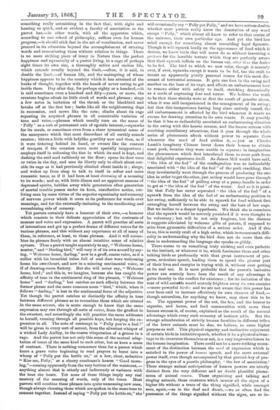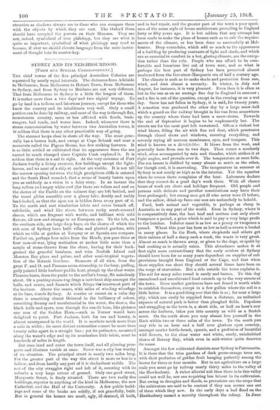PARROTS.
THERE is a legend that the accomplished architect of the Museum at Oxford left directions that the design to be sculptured out in the arch over the doorway should be a sort of arabesque of apes', owls', and parrots' heads,—which he evidently thought in some sense symbolical of the Heads of Houses. In this design the first would, we suppose, have represented the general wisdom, the second the philosophy, and the last the philo- logy of the reigning authorities of the University. The sarcasm was very likely a myth ; but if the leading men at Oxford had voluntarily carried it out, by way of self-warning, they would have shown how wide the analogy really was of the mark by their very readiness to admit the danger that it might cease to be so. The fear of jingling out phrases like a parrot, is just about the only effectual safeguard against the danger of doing so, and the only absolute gulf of distinction between the human talker and the bird. No parrot can be absolutely denied all glimmer of insight into the meaning of what it says with so much grotesque varia- tion of expression ; but no parrot certainly entertains the least dread of repeating as a mere form of words that to which it attaches no meaning. On the contrary, parrots certainly regard the power of repeating words they do not in the least understand as a great achievement, in which they take immense pride. Man, so long as he deserves the name, retains a certain sense of the subordination of language ; while parrots, though they seem far from independent of the law of the association which connects the two, evidently take pride primarily in their command of wards, and only stumble on the grain inside the ear incidentally, occasionally, and, indeed, unconsciously, as the child which has played ball with his oranges all his infancy may accidentally discover that the orange con- tains something nice to eat. If such a child were utterly to fail to draw from this discovery any inference at all as to the -posses- sion of the same edible pulp in the next and all future oranges with which it might meet, except wherever some accidental cir- cumstance in individual cases should force this same fact on its attention,—if it should continue, throughout life, to regard oranges exclusively as yellow balls, though connecting an agreeable flavour with a few stray individuals of the class,—it would, we imagine, show precisely that kind and degree of mental deficiency in re- lation to oranges which all parrots show at all times in relation to human language. Parrots, apparently, prize the art of speech as much or more than men,—only they never get beyond their pride and delight in correct articulation ; and if by chance, as undoubtedly happens now and then, they cannot help associating some one word with a thing, just as they associate the sight of the table-cloth with food, it never suggests to them that all other words have a like power, and, therefore, never guides them to the art of conversation. It is certain that if the dog had the same power of articulation which the parrot has, he would be able to talk rationally on a few easy subjects with men,—for he clearly does pick up very fast the meaning of a great number of words, and, as far as we can tell, respects language, so far as he respects it at all, only for the meaning which he manages to connect with it. Of course that may partly be because he cannot articulate, which makes him study more humbly the meanings of the words his master uses. What makes the parrot so instructive and amusing is, that words mount into its head, and so far turn it that the bird has generally no mind left for their meaning. There is something really astonishing in the fact that, with sight and hearing so quick, and so evident a faculty of association as the parrot has,—in other words, with all the apparatus which, according to one school of philosophy, suffices even for human progress,—it should stick fast in the art of vocalization, and never proceed in its education beyond the accomplishment of uttering words and remembering them without relation to things. There is no more striking piece of irony in Nature than the perfect happiness and equanimity of a parrot living, in a cage of perhaps eight times its own size, a thoroughly active and useless life, which extends usually beyond the limit,—often, it is said, to double the limit,—of human life, and the mainspring of whose happiness appears to be the mastery which it has attained of the husks of thought, together with the knack of never caring to get inside them. Day after day, for perhaps eighty or a hundred,—it is said sometimes even a hundred and fifty—years, or more, the creature begins afresh its little stock of words and phrases ; sings a few notes in imitation of the thrush or the blackbird and breaks off at the first bar ; barks like all the neighbouring dogs in succession, and mews like the cats ; climbs about its cage repeating its acquired phrases in all conceivable varieties of tone and voice,—phrases which usually turn on the name of Polly' as a sort of permanent axis of egoistic interest,—squawks for its meals, or sometimes even from a sheer tyrannical sense of the annoyance which that most discordant of all earthly sounds creates ; titters a little with ladylike gentility now and then, as if it were tittering behind its hand, or swears like the coarsest of troopers if the occasion seem more specially inopportune ; employs itself in unloosing the tins in which its seed is kept, and dashing the said seed ruthlessly on the floor ; opens its door once or twice in the day, and uses its liberty only to climb about out- side its cage as it bad previously climbed about inside it ; sleeps, and wakes up from sleep to talk to itself in softer and more romantic tones, as if it had been at least dreaming of a meaning to its words ; and so, with little illness and no apparent seasons of depressed spirits, babbles away while generation after generation of mortal trouble passes under its keen, unreflective notice, out- living man by mere virtue of the superior equanimity and economy of nervous power which it owes to its preference for words over meanings, and for the externally-imitating to the recollecting and recombining side of memory.
Yet parrots certainly have a humour of their own,—a humour -which consists in their delicate appreciation of the contrasts of -manner and voice and expression. A parrot will practise all sorts of intonations and get up a perfect drama of different voices for its various phrases, and this without any experience at all of many of them, in reference, at least, to those phrases. And it will recom- bine its phrases freely with an almost intuitive sense of relative aptness. Thus a parrot taught separately to say, " Welcome home, master," and " Darling bird," will vary it of its own accord by say- ing, " Welcome home, darling," now in a gruff, coarse voice, as if a collier with his bronchial tubes full of coal dust were welcoming _home his sweetheart, and now in a mincing sentimental voice, as if of drawing-room flattery. But she will never say, " Welcome home, bird ;" and this is, we imagine, because she has caught the affinity of tone in the sentimental ring of the phrases, " Welcome home " and " darling," but catches no such affinity between the former phrase and the mere common noun " bird," which, when it follows " darling," is lost in the sentimental force of the adjective. Yet though the parrot catches so distinctly the affinity in tone between different phrases as to recombine those which are uttered in the same accent, she is acute enough to know that the same expression may run through all sorts of voices, from the gruffest to the sweetest, and accordingly she will practice the same addresses to herself, running through all possible keys, but keeping the ex- pression in all. The note of contempt in " Polly you're a fool !" will be given in every sort of accent, from the silveriest whisper of a wicked Lady Audley, to the coarse vituperation of a groom in a rage. And the parrot has not only this sense of the mutual adap- tation of tones of the same kind to each other, but as keen a sense of contrast. There is nothing commoner than for a parrot which hears a grave voice beginning to read prayers to burst into a whoop of "Polly put the kettle on," or a low, clear, seductive " Kiss me, Polly," or a cheery coachman's hoarse " Good morn- ing,"---coming apparently from the very bottom of the waistcoat,— anything almost that is utterly and ludicrously at variance with the tone she hears. Yet none of these things imply any real mastery of the meaning of words, only of the tones. Most parrots will combine these phrases into quite unmeaning new ones, though always choosing those which are spoken in the same tone to connect together. Instead of saying " Polly put the kettle on," she will occasionally say " Polly put Polly," and we have serious doubts whether most parrots really know the denotation of any word except " Polly," which almost all know to refer to that centre of the universe, their own particular ego. And yet the bird has mind enough for something almost resembling legal figments. Though it will squawk loudly on the appearance of food which it desires, we know birds that will never do so without inventing a pretence for the horrible torture which they are perfectly aware that their squawk inflicts on the human ear, other than the desire to be fed. The bird to which we now refer, though it scarcely ever, if ever, squawks except it wants to be fed, has the craft to invent an apparently purely personal reason for this most dis- sonant of terrestrial screams. It gets one foot in the swing and another on the bars of its cage, and affects an embarrassment how to remove either with safety to itself, shrieking dramatically as a mode of expressing fear and terror. We believe the truth to be that these shrieks were at first the result of genuine alarm, when it was still inexperienced in the management of its swing ; but that this inexperience having long since entirely ceased, the old embarrassment is affected by the bird whenever it wants an excuse for drawing attention to its own wants. It may possibly be that it has so indissolubly associated an embarrassing situation in the swing with this hoarse scream, and the hoarse scream with receiving conciliatory attentions, that it goes through the whole series of phenomena afresh without power to separate them whenever the need of food strikes it, — just as Charles Lamb's imaginary Chinese burnt down their houses to obtain roast pork, because they were unable to separate in imagination the phenomenon which first introduced them to roast pork from that delightful experience itself. As James Mill would have said, " the idea of the feel " of the conflagration was so indissolubly associated with " the idea of the feel " of the pork crackling, that they involuntarily went through the process of producing the one idea in order to get the other, just as they would have gone through " the idea of the feel" of pulling away at a pump-handle in order to get at " the idea of the feel " of the water. And so it is possi- ble that Polly has never separated " the idea of the feel " of a squawk from the idea of the feel of an embarrassing position in her swing, sufficiently to be able to squawk for food without first entangling herself between the swing and the bars of her cage. But we incline to a deeper hypothesis. We think she is conscious that the squawk would be severely punished if it were thought to be voluntary ; but will be not only forgiven, but the distress it suggests alleviated by welcome gifts of potato, if supposed to arise from gymnastic difficulties of a serious order. And if this be so, this is surely craft of a high order, which increases one's diffi- culty in understanding why the bird does not do more than she does in understanding the language she speaks so glibly.
There seems to us something truly striking and even pathetic in the instinct, or whatever it be, which fascinates these and other talking birds so profoundly with that great instrument of pro- gress, articulate speech, leading them to spend the greater part of their lives and energies in toying with it, without ever getting at its real use. It is most probable that the parrot's imitative power can scarcely have been the result of any advantage it gains thereby in the conflict for existence ; for its imitation of the roar of wild animals would scarcely frighten away its own enemies —more powerful birds; and we are not aware that this power has ever been said to increase effectively its own chances of food, — though naturalists, for anything we know, may show this to be so. The apparent power of the ant, the bee, and the beaver to organize, and house, and feed communities with more than human success is, of course, explained as the result of the natural advantage which every such economy of instinct adds. But the strange adumbration of strictly human faculties in different tribes of the lower animals must be due, we believe, to some higher purpose as well. This physical capacity and instinctive enjoyment of certain birds in imitative speech, whether it be a physical advan- tage to the 'creatures themselves or not, is a very impressive lesson to the human imagination. There could not be a more striking monu- ment of the distinction between the need of expression which is satisfied in the power of human speech, and the mere external power itself, even though accompanied by that ground-key of pro- gress in the eyes of a puerile philosophy, ' the law of association.' These strange animal anticipations of human powers are utterly distinct from the very different and no doubt plentiful pheno- mena of animal reason. These organizing and talking and singing animals, these creatures which master all the signs of a higher life without a trace of the thing signified, while amongst men, again,—as in the deaf and dumb, —we so often find the possession of the things signified without the signs, are as in-
structive as shadows always are to those who can compare them with the objects by which they are cast. The Oxford Dons should have accepted the parrots on their Museum. They are not, indeed, symbolical of true philology, but they are what is quite as important, symbolical of what philology may tend to become, if ever we should elevate language from the mere instru- ment of thought into its master-key.
































 Previous page
Previous page